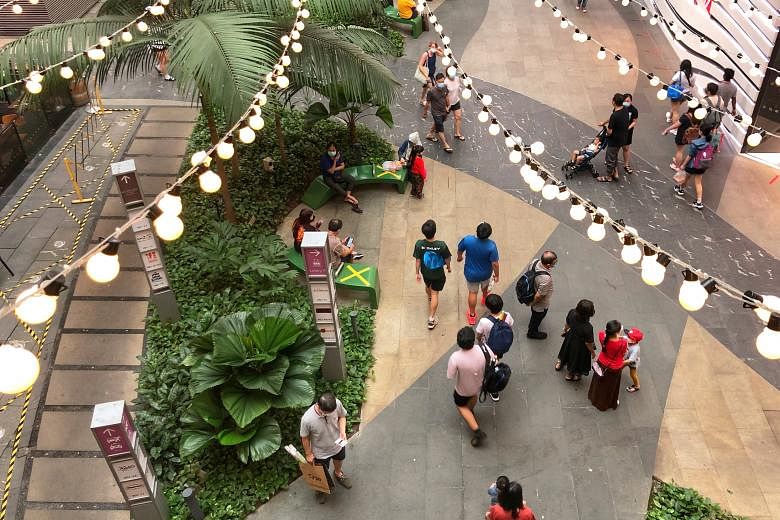SINGAPORE - Singapore is bracing itself for an Omicron wave by boosting hospital and testing capacities, so that the nation can ride the next Covid-19 surge even as reopening plans continue.
While the country has not detected any community transmission of the Omicron variant yet, it is only a matter of time before this happens, said Trade and Industry Minister Gan Kim Yong at a press conference on Tuesday (Dec 14).
"This may then lead to another surge in cases because of the highly infectious nature of the Omicron virus. We must therefore prepare ourselves for such a scenario."
Given the increased transmissibility of the new variant, vaccination-differentiated measures will be expanded to more places from Feb 1.
At the same time, more people will be able to return to their workplaces, given that 97 per cent of Singapore's workforce is now fully vaccinated.
From Jan 1, up to 50 per cent of those able to work from home will be allowed back in the office, in a nod to the challenges of having remote working as the default.
However, the Government is considering removing a concession that allows unvaccinated people to return to the workplace if they test negative for Covid-19, said Finance Minister Lawrence Wong.
There have been 16 Omicron cases detected in Singapore to date, comprising 14 imported cases and two local cases who are airport passenger service staff.
The variant has been found in more than 60 countries worldwide.
Mr Wong cautioned that the highly transmissible Omicron variant could result in a potentially bigger wave of Covid-19 cases than the one caused by the Delta variant.
Singapore will thus keep its existing safe management measures in place for now, he said, adding that the country's overall public health posture is geared towards preparing for Omicron.
To gear up for the next surge, Singapore is making plans to increase its intensive care unit (ICU) capacity to 500 beds, said director of medical services Kenneth Mak. It is studying whether infrastructure upgrading needs to be done in public hospitals to support this, he added.
ICU bed capacity stood at around 280 beds in late October, at the peak of Singapore's Delta wave, with hospitals on standby to increase this to 350 beds if necessary.
The multi-ministry task force handling Covid-19 set out how it will also press on with the national booster vaccination programme, ramp up healthcare capacity and promote regular testing.
For one thing, general practitioners will play a bigger role in helping to manage Covid-19 patients who are able to recover at home and do not require hospital care.
In addition, the country is prepared to increase capacity in its community treatment facilities, so that hospital patients in stable condition can be transferred there if an Omicron wave hits.
Another 60 quick test centres, run by private operators, will be set up around Singapore to make Covid-19 testing more accessible.
And to help companies quickly detect Omicron cases, the Government will continue to subsidise compulsory rostered routine testing in higher risk settings until the end of March next year.
The expansion of vaccination-differentiated measures means that people will have to be vaccinated to enter a wider variety of settings.
These include all indoor sports facilities - even those that are privately owned - institutes of higher learning and leisure guests in hotels, hostels and serviced apartments.
All events - even those with fewer than 50 attendees - will also be subject to these requirements. These include funeral memorial services and work-related events.

But students who are completing full-time Nitec, Higher Nitec, diploma or degree programmes will be exempted from vaccination-differentiated measures when entering their respective educational institutions.
Funerals, wakes and funeral processions will also continue to be capped at 30 people at any one time, and will not be subject to these measures.
Separately, the authorities announced that the quarantine-free land travel scheme between Singapore and Malaysia will be expanded, to allow vaccinated Singapore citizens to enter Malaysia via the Causeway from next Monday (Dec 20).
Similarly, vaccinated Malaysian citizens will also be able to enter Singapore.
Currently, only citizens, permanent residents and long-term pass holders of the country they are entering are able to travel via the scheme.
Read next - Singapore prepares for Omicron wave: What you need to know about new Covid-19 measures


